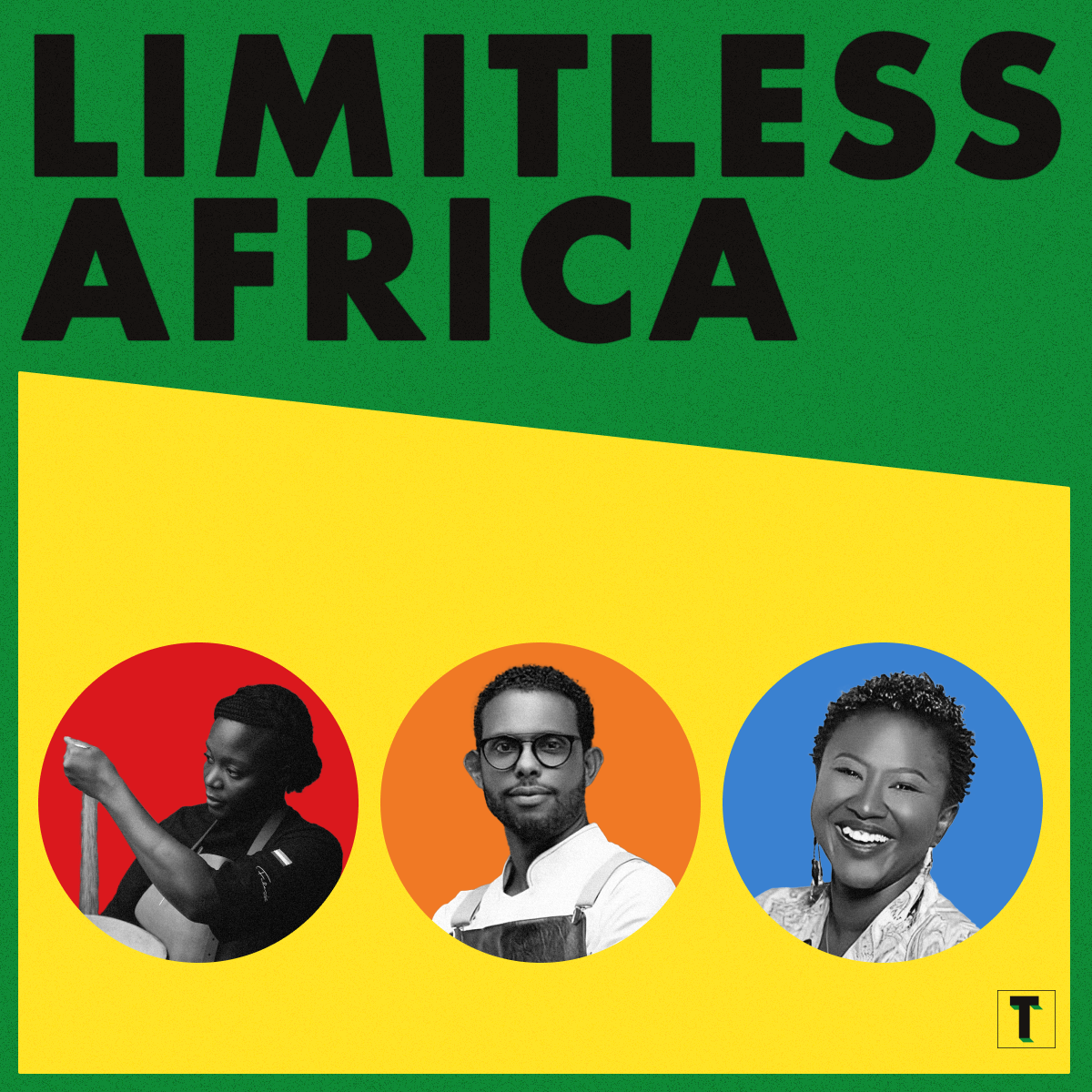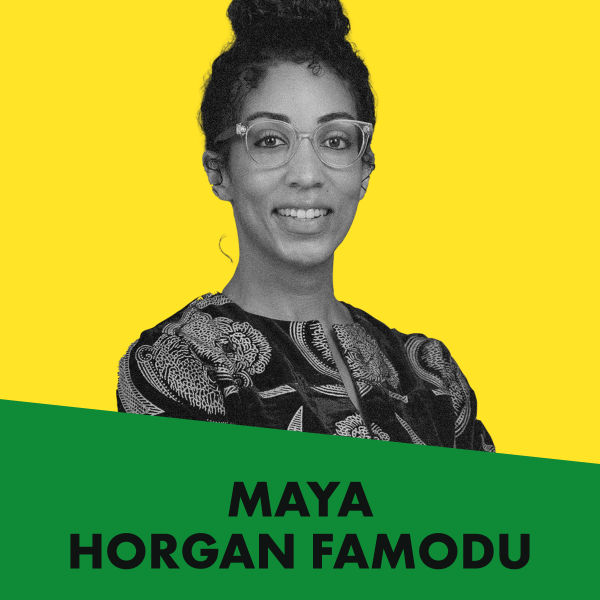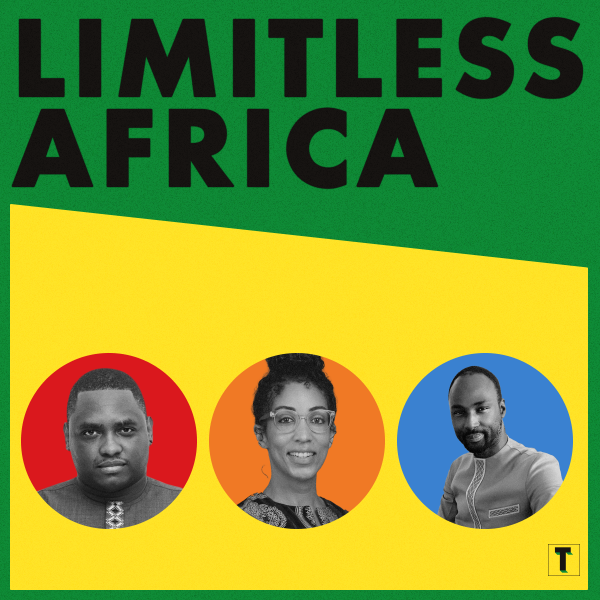Which meal reminds me of home?
With guests Chef Binta, Chef Helt Araujo, Yasmine Fofana

Episode notes
Is there one dish that sums up childhood?
Transcript
For this episode, we asked three African foodies about the dish that reminds them of home.
Chef Binta is the founder of Fulani Kitchen Foundation. She is the winner of the Basque Culinary World Prize.
Chef Helt Araujo runs the Flor Do Duke restaurant in Luanda, Angola. He’s part of the research project Ovina Yetu which catalogues Angolan ingre...
For this episode, we asked three African foodies about the dish that reminds them of home.
Chef Binta is the founder of Fulani Kitchen Foundation. She is the winner of the Basque Culinary World Prize.
Chef Helt Araujo runs the Flor Do Duke restaurant in Luanda, Angola. He’s part of the research project Ovina Yetu which catalogues Angolan ingredients.
Food entrepreneur Yasmine Fofana is a culinary food blogger (Afrofoodie) and founded Abidjan Restaurant Week.
Transcript:
What meal reminds you of home?
From TRUE Africa, I’m Claude Grunitzky, and this is Limitless.
In this episode we’re asking which meal reminds you of home?
“They will bring the entire family together to cook that meal.”
“They served me a little bit on a plate and they gave me a taste.”
“My mother makes one of the best in the world.”
Claude:
Welcome to Limitless, the podcast that asks the questions that matter for Africa. We’re looking for African solutions to African problems.
In each episode, we’re asking three guests one question that matters to Africans. And – no surprise – they don’t always agree.
The Limitless Podcast is supported by the U.S. Department of State and the Seenfire Foundation.
The meal that reminds me of home is fufu and egusi soup. My mother used to make it for me and my sister. You probably have your own version which instantly transports you back to childhood. For this episode, we asked three African foodies about the dish that reminds them of home.
Based in Accra, Ghana, Chef Binta is the founder of Fulani Kitchen Foundation. She is the winner of the Basque Culinary World Prize. Here’s her conversation with our journalist Abigail Musherure.
Abigail:
What’s the meal that reminds you most of home and if you could just give us a memory that’s attached with that?
Chef Binta:
Is something called Chorbal, it’s actually not an everyday meal. It’s a very ceremonious dish. So usually the only serve it when in the Fulani culture, the moment you’re seven years old, you start learning the Holy Quran, so and you graduate as you go. So the reason why that particular dish reminds me so much of home and my childhood and my fondest memories, is because whenever a kid is graduating, they will bring the entire family together to cook that meal. And usually it’s like a snack. So they’ll soak rice, and then they’ll pound it to add honey to it or sugar.
They serve the dish they gather all the kids together, and then they will throw
assorted candies, and it’s always a competition for us to fight and who gets the most candies
would actually get a special dish like the Jollof the Ghanaian style jollof. So it was so much fun, you know, fighting with your cousins and just grabbing candies and feeling so you know, good about it. It reminds me so much of home and it’s a snack that is so dear to me.
Abigail:
Exciting I love that. And I was curious if you could just tell us about how all of this ties in with the Fulani Kitchen Foundation and why founding that was so important to you?
Chef Binta:
Fulani is the largest nomadic tribe in in the world. We are across western, Central Africa. We are nomadic people. We are cattle herders. That’s what most people know us for. But we are more than that.
So I started traveling across Africa, I spent a lot of time in these rural communities with these women, you know, the gatekeepers, the custodians of gastronomy, in Africa. They take their time to teach you about all these ingredients, all these techniques, the food systems. And I go back to Accra, Ghana, and I host dinners inspired by these communities.
I even step out of Africa and host dinners around the world. But while I’m in these villages, I’m always faced with the challenges these women are going into, it’s not something you can turn a blind eye to.
I want to champion things that are happening in these communities that I’m so connected for these communities are my source. So that’s how I’m Fulani Kitchen Foundation started.
And the first thing we focused on was to build water wells, because this is one of the challenges to face, having clean water. And then also Fonio, which is a big part of my story, I actually experienced it as a child, I was a refugee child, so we started growing Fonio.
So once the conversation started, about Fonio I wanted to add my voice to it because I have a first hand experience of how nutritious, how sustainable it is. How it grows fast, it’s drought resistant, it can thrive in drought areas, you don’t need too much water to grow it, you don’t need to plough the land too much.
Abigail:
What’s your dream or how do you imagine the Fulani Kitchen Project over the next five years or just a dream for its future?
Chef Binta:
So my main goal and hope is to see Fulani Kitchen Foundation spread out across Africa.
In 2019. I went on a tour. I did DC, New York. I took the nomadic experience there and it was it was very interesting. My goal is to share the experience. So take a piece of Africa and share it with the world and I cannot do it by just staying in Africa. I go everywhere. There is no limitation.
Claude:
Chef HELT ARAÚJO runs the FLOR DO DUKE restaurant in Luanda, Angola. He’s also part of the research project Ovina Yetu which catalogues Angolan ingredients. He spoke to our producer Nekane de Ozamiz.
Nekane:
Hello, and welcome, Chef Helt. Tell us about yourself, where you grew up, when you started cooking, and how you got to where you are now.
Chef Helt:
I am Angolan, I was born in Bengela, I am from Angola. I started cooking around 1998. That’s when I started school and did my training in Portugal. I did all of my training and all of my courses outside my country. I was away for ten years. And then I rebelled to return to Angola.
I am like quite a few Angolans, we were privileged to have the opportunity to go for training abroad. And I think that all of us who had this opportunity, we now have a duty to pass on knowledge to the millions of Angolans who did not.
Nekane:
Which dish reminds you most of home?
Chef Helt:
The dish that most reminds me of my childhood, which is the taste of home, which reminds me of the comfort of my family, my mother’s lap, has always been a very typical Angolan dish. It is called Calulú.
There is a story that ever since I was a kid, when I was four or five years old, whenever Calulú was served at lunchtime, they put me on the counter, they served me a little bit on a plate and they gave me a taste. Depending on my level of satisfaction, my mother knew if Calulú was ready, whether it was time to go to the table, or not. This was always the ritual.
Nekane:
Can you talk a little about the ingredients of Angolan cuisine?
Chef Helt:
We have a project that is Ovina Yetu, which means “our thing”, our product,
which is a group research project. We are doing a lot of surveying and research work,
of what the indigenous Angolan product is.
Today, after a year of research and study, we have already managed to catalogue 3650 products, including fruits, proteins, herbs, seafood, etc…
Our history tells of the entire emigration process for those who went, but the story misses out the return – those who have come back. This Calulú dish, for me, in my process of writing a book now, has a lot to do with that story. With those who return, with those who return from the Americas, with those who return from Brazil, and who may have contributed to the revival of this Calulú dish.
Nekane:
How do you incorporate Angolan flavours into your cuisine? What does Angola taste like?
Chef Helt:
The objective is to look at Angolan cuisine, not as a process of working with traditional angolan dishes, but rather, to bring out the essence of the Angolan product, the potential of our products, so that they can then be used in new recipes, contemporary recipes, in international recipes… and thus bring to the fore the flavours of Angola, what Angola really tastes like.
Claude:
Yasmine FOFANA isn’t a chef per se but she knows her food! She runs the blog Afrofoodie and founded abidjan restaurant week. She spoke to our producer Mafoya GLÉLÉ KAKAÏ.
Mafoya:
Tell us about yourself and what you do?
Yasmine:
Thank you for the invitation. I enjoy Limitless a lot. I ‘m Yasmine Fofana. I live in the Cote d’ivoire. I started off as a content creator. But I don’t define myself like that any more, one could say I’ve moved from content creation to entrepreneurship.
So I am now a culinary entrepreneur. In 2021, I created the first culinary blog in Cote d’ivoire and that has evolved into a magnificent adventure. In parallel I work in the culinary tourism sector and I highlight African cuisine and gastronomy – that’s my mission.
Mafoya:
Which traditional African meals remind you most of your culture and home?
Yasmine:
Leaf stew – that’s one of the meals that reminds me most of my childhood – that’s Guinean leaf stew. Because you must know there are several versions of leaf stew depending on what country you’re in.
So Guinean leaf stew is particularly dear to my heart and my mother makes one of the best in the world – she also makes fonio. Fonio that we eat here in Cote d’Ivoire, in the north, and also in Guinea.
I think that is really my most favourite meal. Because it’s a meal for celebrations.
SO I really have this feeling and this memory everytime I think of a meal, of my childhood, and even now.
Mafoya:
How important is it for you to preserve traditional African recipes?
Yasmine:
It’s primordial. Today, it’s primordial because I have the impression – well it’s more than an impression – it’s being lost in our culture. In any case, before, it was done orally. Done when a mother or a grandmother taught recipes to her daughter or granddaughter, it was done orally.
So today it’s important. And many chefs, content creators, journalists and researchers, are starting to work on that. To gather the recipes, write them down, write books, write white papers etc. I am trying to be part of this movement, to play my humble part, with what I am doing with Afrofoodie and content creation. On social media and with digital, it’s primordial.
It is part of who we are. But it’s important that we put it all together, gather it, share it. It is done in different ways today, with video content, but in writing, it’s even better.
So lots of books, as I said, lots of research, lots of conferences. Everything that can be done to stop us from losing this heritage because without it, we are nothing.
Mafoya:
How can African cuisine be celebrated and shared in order that it is better known globally?
Yasmine:
The first thing I always say is that you can’t expect others to embrace our culture and respect it if we ourselves aren’t ambassadors of our cuisines and food culture. So therefore, it’s among ourselves that we can reappropriate them and know them.
And we have to adopt that strategy, do we cook? Do we know the recipes? Do we promote them? Are we proud of showing them off? Whatever it looks like! It is always said that African cooking isn’t very sexy.
Well whatever some meals may look like, one has to be proud of its taste! That we want to taste it before others come and follow our footsteps. We want to say we liked it before it became popular on an international level. That’s another battle that we’re starting to fight. But also at the African level. So that Africans can promote all our culinary cultures. Not only the Ivorians promoting gombo sauce or gouagouassou sauce, or kedjenou in Cote d’ivoire, but the Ivorian who goes to Cameroon, and tries ndole or goes and eats herou, who goes to Nigeria and eats the euh, or the moin-moin etc. And these kinds of things are very important before even competing with others at the international level, we need first of all to celebrate our cuisines.
Claude:
Thanks to all our guests.
This isn’t about michelin stars, it’s about the meal that reminds you of home. It’s about belly and soul.
Please tell us about the meal that reminds you of home using the hashing #limitlessAfrica. And share this episode with anyone who appreciates African cuisine.
Listen next
"It wasn't just an overnight thing. Seeds were planted."
With guests: Maya Horgan Famodu
LISTEN NOW 55 min
How did I make my first million?
With guests: Maya Horgan Famodu, Moulaye Taboure, Moutagna Keita
LISTEN NOW 15 min








